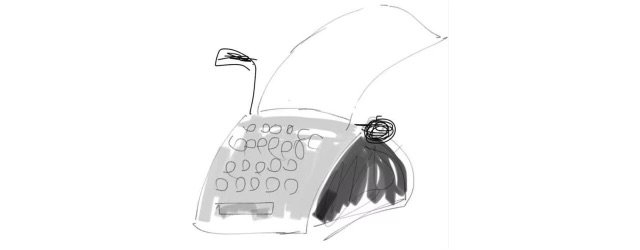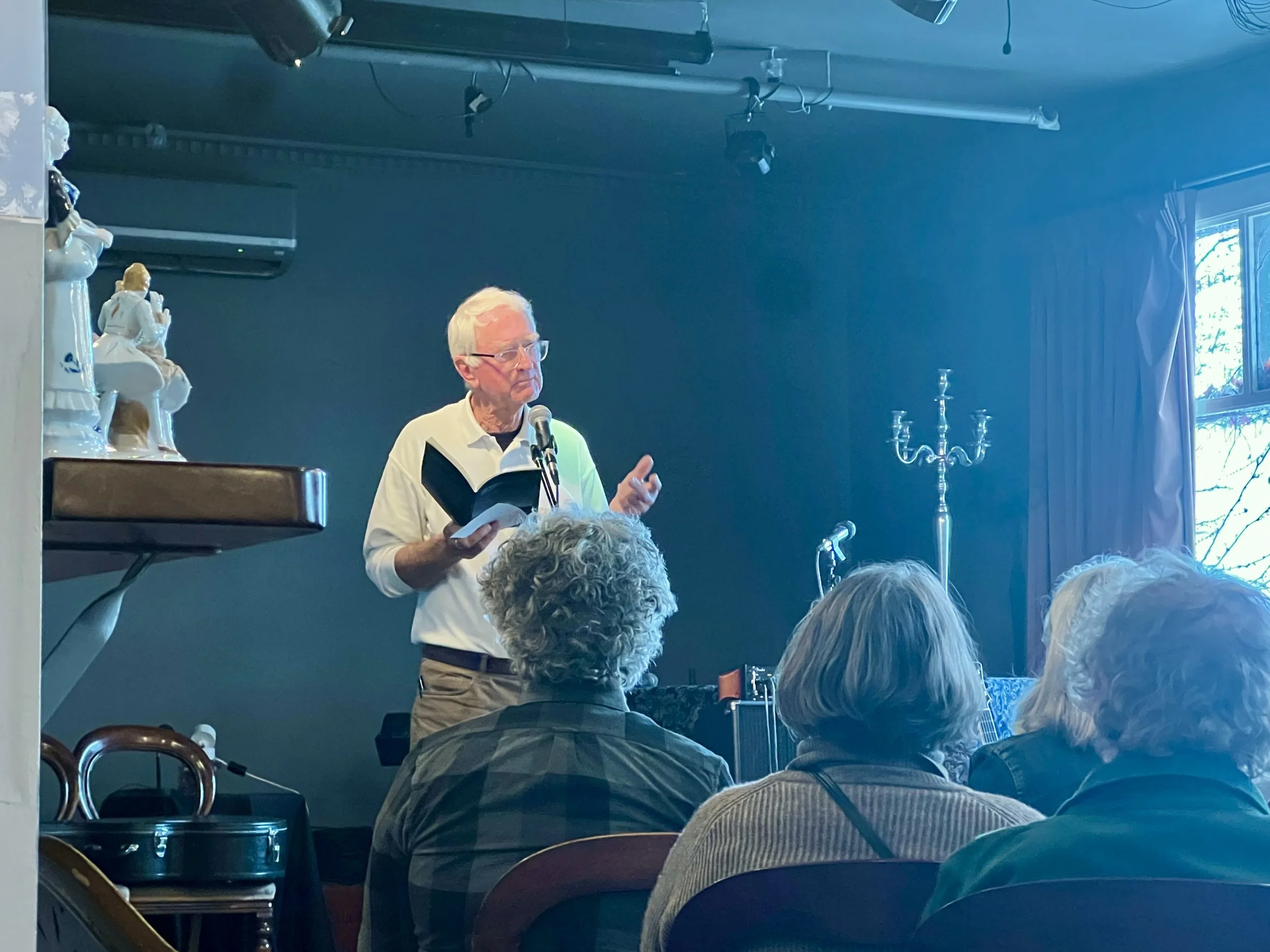‘The Subject of Feeling’
Ross Donlon reading at the launch of The Naming of Clouds
Launch speech for The Naming of Clouds by Ross Donlon
Northern Arts Hotel, Castlemaine
20 September 2025
One of the first things I learned about Ross Donlon—apart from the fact that he’s a fine poet; apart from the fact that he’s a tireless servant of literature, promoting poetry readings in Castlemaine and online for years—apart from all of that, one of the first things I learned about Ross is that he loves to swim.
We started chatting after one of the countless readings Ross has organised, and he told me he regularly went through his paces at Expedition Pass Reservoir.
The way Ross spoke about swimming the reservoir, I knew he was serious. And, speaking as someone who is—at best—a dog-paddler, I was impressed.
I mention swimming because water is an elemental part of Ross’s new collection of poetry. It’s everywhere. From the ‘sunken oasis’ of the ocean in the opening poem, ‘Caravan’; through to ‘Skin’, which I just read; through to the ‘moon’s skin’ of the ‘pattern of lace from the passing ghost of my ship’ in the closing poem, ‘My Ship’; through to the final photograph—the collection is illustrated by beautiful images—of a boat leaving the safety of its harbour to head out to sea.
But what does all this water mean? The first time I read The Naming of Clouds I felt the recurring water imagery was about life’s voyage. The water in the poems was a place where the present and the past—the living and the dead—could come back together, coexist, be made whole again. Water was a place of reflection, then; a place of community; a place of healing—much like poetry, and much like the poetry readings that Ross hosts.
Re-reading the collection this week, I still feel all of that, but I feel something else. Something more. The something more I feel is this: that, in Ross’s poems, water is love—and that is powerful because love is the king tide of poetry. I’m not just talking about eros, by the way. I’m talking about love of family, love of life, love of place.
Given the poems in this collection, which read like a memoir in song, begin during World War Two, I’m glad that it is brimming with so many poems of unconditional love, because, much like the 1940s, we have entered another troubled time of wilful misunderstandings, tribal hatreds, and ever-escalating violence. And, although, to paraphrase the great humanist artist William Kelly, poetry cannot stop a bullet, it can help create—and keep together—the communities of likeminded souls we need to change the world for the better.
My point: art is not everything, but, given the ill-temper of our times, it is, as the poet Alison Croggon has written, ‘A way of bringing us together to critically consider who we are in relation to the realities in which we live. In our atomised world, art reaches for connection, expressing the fullness of what we are, the variousness of our pasts and our futures. Art gives us courage.’
Courage. That’s another word that came to mind, reading Ross’s poems. It takes courage to write poems of unconditional love: poems that feel like both an end and a beginning of that dark water from childhood that we all carry around inside ourselves; poems that feel like resolution; poems that feel important. Poems that matter, in other words.
After reading this book, I told Ross it felt Blakean. I said it reminded me of William Blake because The Naming of Cloudsreads like Ross Donlon’s songs of innocence and experience combined—starting with the ‘Hollywood idyll’ of his parents’ fibro honeymoon in Sydney and flowing through to the ‘water’s skin’ of Expedition Pass—and because of the collection’s abiding and deep undercurrent of feeling. As Ross writes in the concluding lines of ‘Water’:
I swim each morning in a reservoir, a place where something is kept in store.
The something being kept is its soul – and mine – in this meditation on water.
So, what are we to make of all this? How should we respond to this collection of love poems that are also a meditation on the deep waters of life? I don’t have a prescriptive answer to those questions. I don’t have that kind of answer because life isn’t like that: declarative. Life is more like a poem, meditative; the reading takes a moment, and the understanding takes an eternity.
The closest I can come to explaining the meaning, for me, of The Naming of Clouds is to draw your attention to the fact that I keep coming back to the subject of how it makes me feel. I keep coming back to the subject of feeling because these poems trigger me when I read them—and that’s exactly what I’m searching for with art, be it paintings or music or poetry. It’s like this: the older I get, the better I comprehend the depths of my ignorance, the deeper my need for art grows.
Why do I need art? I need art—whether it’s a poem by Ross Donlon or a painting by David Davies or the music of Bryce Rohde, the wonderful jazz pianist Ross namechecks in one poem—I need art because it wakes my soul and makes me feel.
There’s that word again—feel. Making art requires technique—and these poems display great technique—but, first, it demands emotion. The poetry collections that resonate most with me, therefore, are the ones that have emotional bones—and wake me up, and make me feel, and give me courage. The Naming of Clouds is that kind of collection.
All of which is why it is my pleasure to declare this book launched.
Congratulations, Ross.

